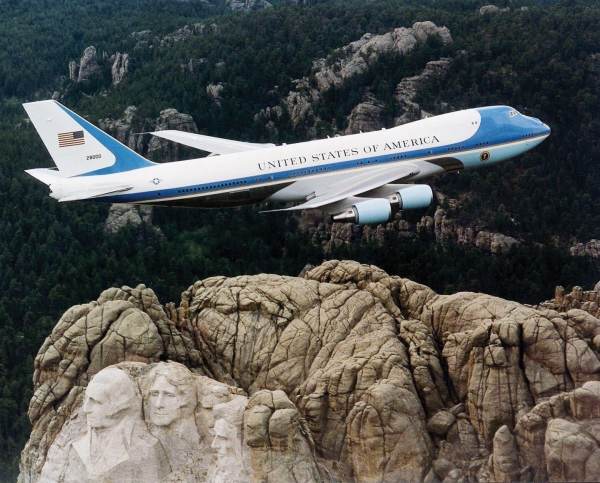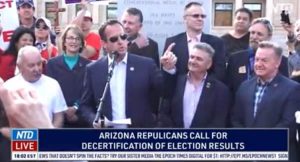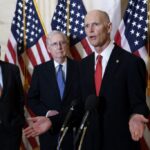The Constitution demands that the Presidential race be held
on a specific day (the first Tuesday in November) and should be
completed on that day – argues a legal expert.
One legal scholar argues the above and presents his case in
detail
at thepostemail.com.� The argument is simple. The Constitution
requires Presidential elections to be performed on a certain day.
It doesn’t say they should run on for days or weeks like we saw
in 2020. Any states who waited till after election day to
manufacture votes and steal the election for Joe Biden are in
trouble. These states’ results are void due to being outside
Constitutional mandates.
Below are excerpts from this reasonable argument:
“When the federal statutes speak of ‘the election’… they
plainly refer to the combined actions of voters and officials meant
to make a final selection of an officeholder… By establishing a
particular day as ‘the day’ on which these actions must take
place, the statutes simply regulate the time of the election, a
matter on which the Constitution explicitly gives Congress the
final say.†Foster v. Love, 522 U.S. 67, 71-72 (1997)We will take a closer at this binding precedent below, but in
preview, please understand that it emanates from a 9-0 decision of
the United States Supreme Court, wherein the entire Court joined,
not just the outcome, but also the opinion on this very point.The voters vote. The officials count. These combined actions
form “the election,†and the election must be decided on the
day. States that failed to make a final selection of officeholder
by midnight after Election Day have violated the statute,
subjecting the nation at large to the very evils Congressionally
mandated deadlines were drafted to prevent.Federal Election Day statutes were designed to curtail fraud,
and to infuse a prima facie sense of integrity in our electoral
process. But these States – in failing to obey Congressional
deadlines – have flagrantly attempted to preempt federal law.
This is certainly prohibited, and this is why the late election
results are void……I honestly do not believe the Supreme Court can avoid
nullifying the Presidential Election… if President Trump, and
some of you too, will plead this in court……3 U.S.C. § 2 kicks the decision back to the State
Legislatures after a failed election renders the previous results
void. Failed elections nullify all votes, not just some votes, not
just late votes, not just illegal votes. The election itself is
void in late States.Which States are late? The answer will be a question of first
impression for the Supreme Court. But the only fair answer is
obvious. If, at midnight, one candidate had enough of a lead, so
that there was no mathematical possibility whatsoever of their
being caught – after a review of the votes already counted, and
the votes remaining – then the final selection has been made on
time. But if the outcome was uncertain at Midnight, the State
violated the deadline, and its election is void……State elections that fail to choose winners by the Midnight
deadline enacted in 3 U.S.C. § 1, immediately trigger the
authority of 3 U.S.C. § 2, giving the Legislatures alone a
Congressional extension to choose electors thereafter. As such, the
failed elections are void, and all State statutes drafted to
discern a winner after Election Day are preempted by 3 U.S.C § 1,
and § 2……The elections for President in Pennsylvania, Michigan,
Georgia, Arizona, Wisconsin and Nevada were void at the stroke of
midnight after Election Day, because a victorious candidate
wasn’t discerned by Midnight……It’s important to note here that early voting helps reduce
the stress on a State’s electoral process, by pre-canvassing
ballots in advance. This makes it much easier for a State to make a
final selection on Election Day, whereas elections consummated
after Election Day contribute nothing to electoral efficiency and
are subject to many of the same evils as multi-day voting……Reading Foster v. Love, together with the 9th Circuit’s
analysis in Voting Integrity Project v. Keisling, we know that
consummating an election before federal Election Day is prohibited,
and that early voting is not prohibited, as long as the election is
finally consummated on Election Day. If that be the case, then
statutory construction makes it obvious that elections consummated
after Election Day are preempted by the federal Election Day
statutes.
This legal argument is sound. The six states mentioned
above who didn’t declare a Presidential winner on Election Day
acted outside the Constitution (which doesn’t even consider the
massive amount of fraud that occurred everywhere). These states
should resolve these voided elections in their
legislatures.
The post
Legal Scholar Argues that States Which Were Undecided on the Winner
of the Presidential Race at Midnight Election Day Acted Outside the
Constitution and Their Results Are Therefore Void appeared
first on The Gateway
Pundit.






